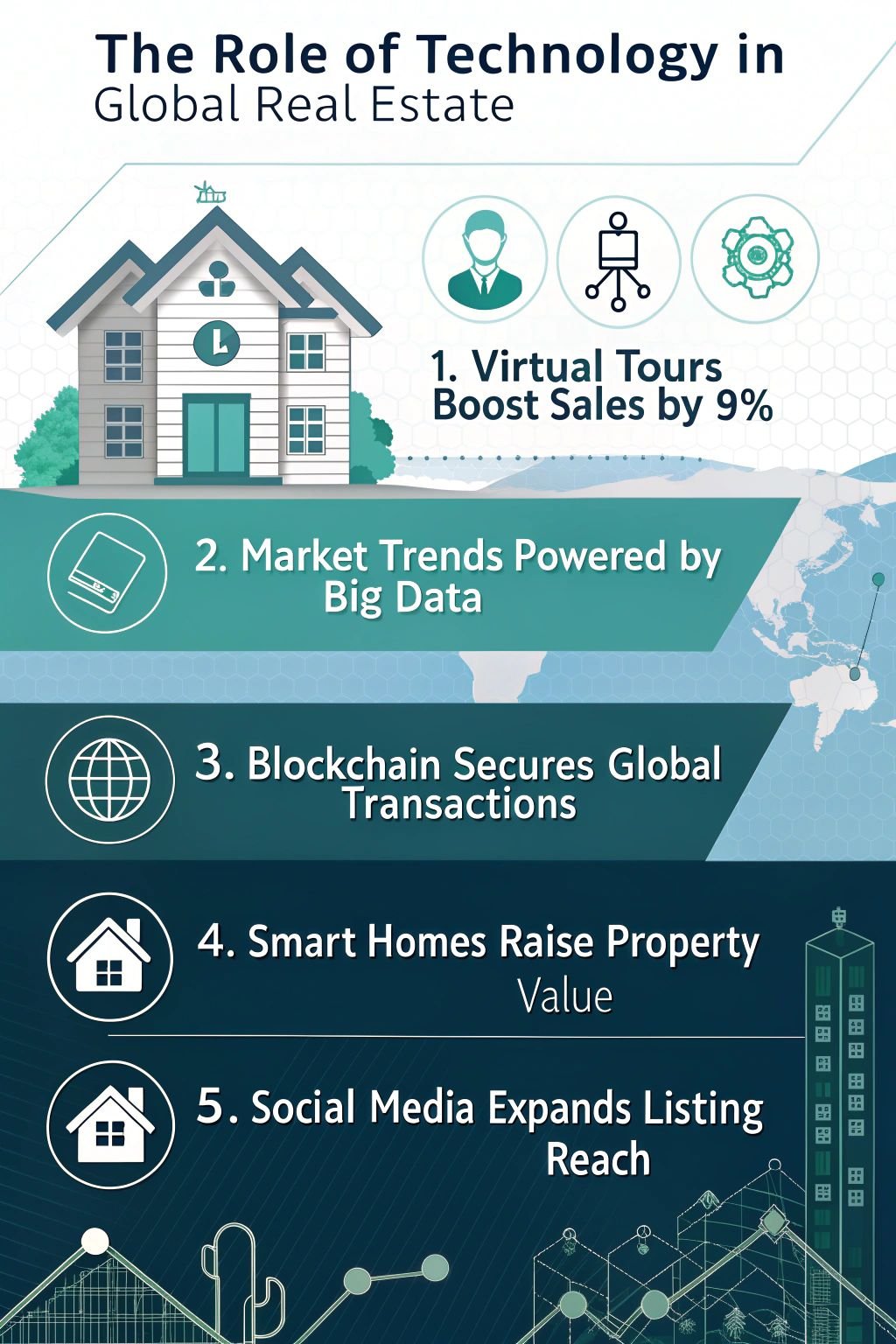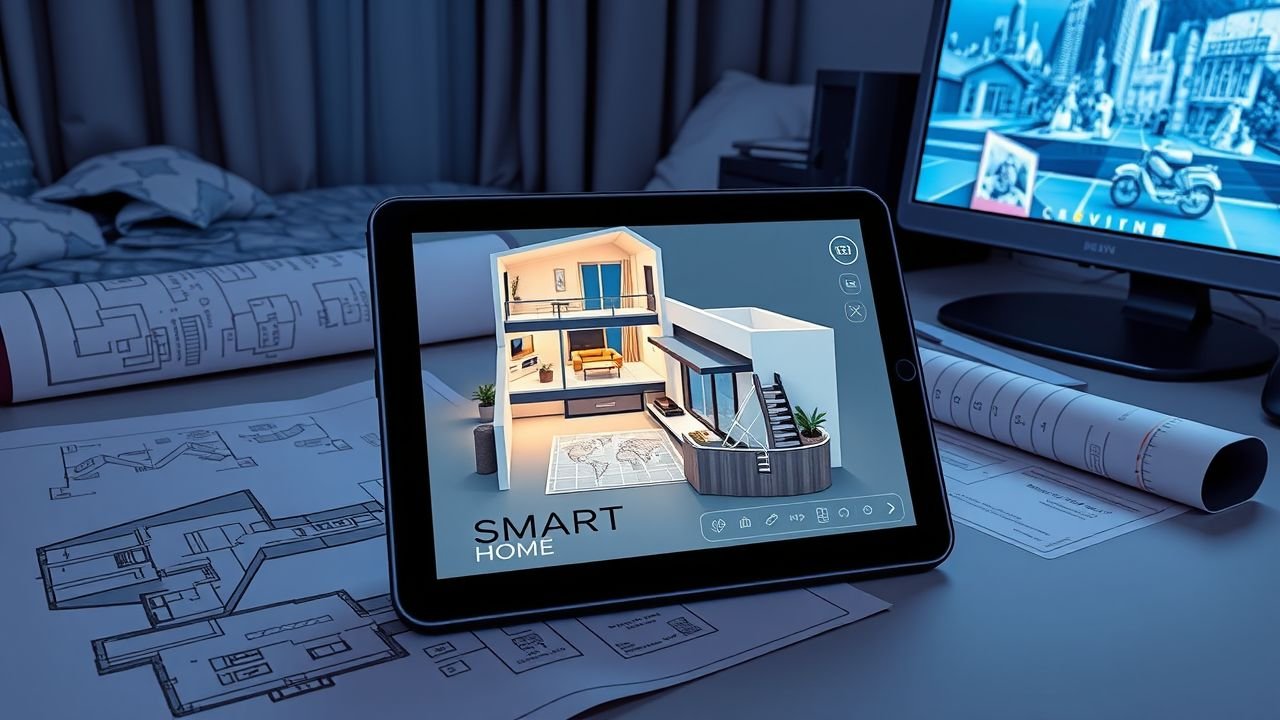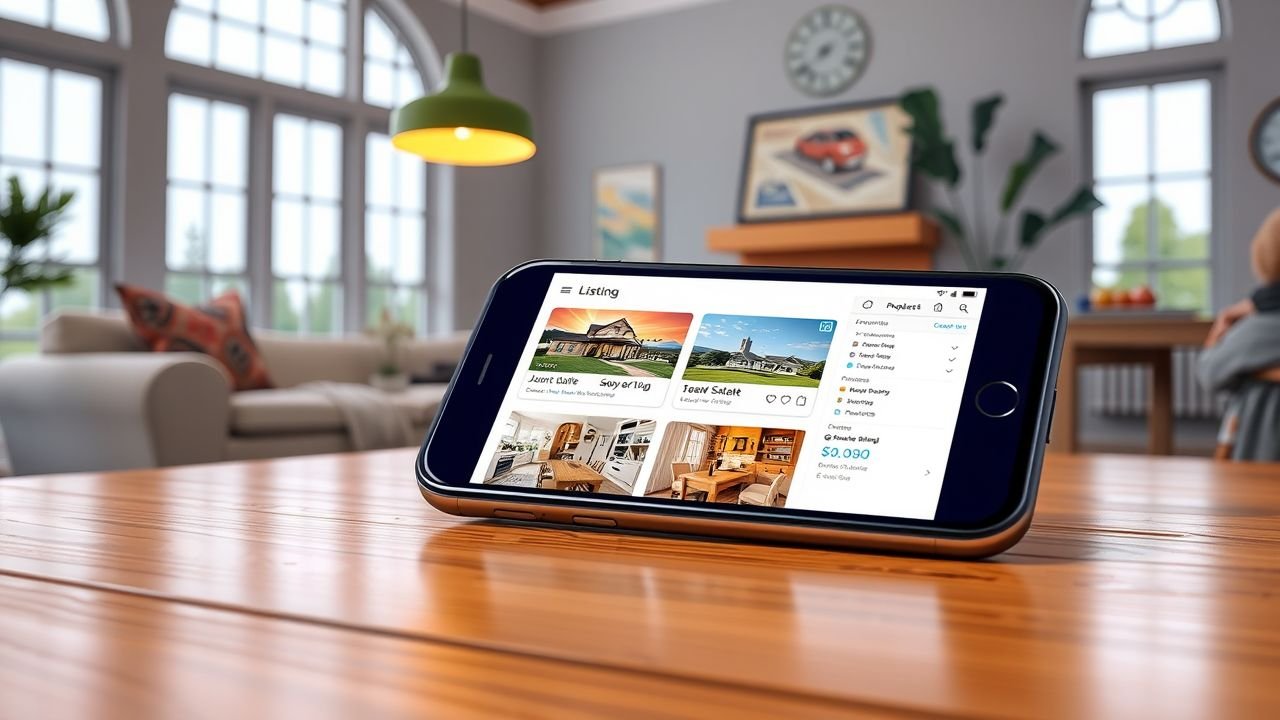Are you feeling overwhelmed by how quickly technology is changing real estate? Whether you’re buying, selling, or investing, it can feel hard to keep up with the latest tools and trends.
Finding the right property or making smart investment decisions often takes time and effort.
Did you know that technologies like virtual reality (VR) and artificial intelligence (AI) are transforming how properties are listed, toured, and sold? These advancements make processes faster, smarter, and more accessible for buyers and sellers worldwide. 1
This blog will show you exactly how technology in real estate helps simplify your search, improve transactions, and provide data-driven insights. Explore these impactful tools reshaping the market today! 3
Key Takeaways
- Technology like AI, VR, and AR is changing real estate processes. Virtual tours gain 87% more views and sell for 9% higher prices compared to listings without them. 2
- Platforms like Zillow and Redfin make home searches easier with filters by price or location. Big data analytics forecast market trends for wiser decisions. 1
- Blockchain strengthens transaction security by utilizing tamper-proof records. Tokenization enables fractional property ownership, making investments more accessible worldwide. 10, 18
- Smart home technology powered by IoT improves energy efficiency while increasing property values—Malaysia’s smart home market is projected to reach $421 million by 2025. 12, 13
- Social media helps REALTORS® engage with global buyers; Instagram increases listing exposure through visuals, driving lead generation for 52% of agents. 5, 15.

The Role of Technology in Global Real Estate

Technology shapes how you buy, sell, and invest in real estate. It helps make property searches easier, improve communication, and provide better insights for decision-making.
Efficient Property Search and Listing
Digital platforms like Zillow, Redfin, and Realtor.com have transformed how you find or list properties. Instead of relying on printed listings, online property listings allow you to search for homes anytime and anywhere.
These tools enable you to filter properties by price, location, size, or even proximity to schools. As a seller or agent, these platforms ensure your home reaches millions of buyers quickly.
Smart filters save time by showing only what matches your preferences. You can even refine searches using keywords like “smart homes” or “green buildings.” For investors tracking market trends, big data analytics predicts property values based on sales histories.
These insights make it simpler for you to decide what’s worth buying—and selling—with well-targeted advertising increasing visibility online. 1Virtual Tours and 3D Visualizations
A property listing is only as strong as the experience it offers. Virtual tours and 3D visualizations bring properties to life, offering a detailed view without stepping foot inside.
As a buyer or investor, you save time by exploring homes remotely with clarity and convenience. Properties featuring virtual property tours attract 87% more views online and sell for 9% higher prices compared to those without. 2
These tools cater directly to modern preferences. Over two-thirds of buyers (67%) prefer listings that include immersive experiences like virtual reality tours over traditional photos.
Sellers benefit too, as potential buyers make faster decisions when they “experience” every corner of your home digitally before visiting in person.
“54% of buyers won’t consider properties that lack virtual tours.”
Sharper visuals through augmented reality (AR) or VR take this even further. Imagine exploring kitchens, inspecting ceilings, or viewing backyard spaces—all while sitting at your desk! With such demand for user-friendly tech solutions, adopting these options gives you an advantage in today’s competitive real estate market.
Data-Driven Insights
Virtual tours highlight properties effectively, while data-driven insights provide a better understanding of their value. AI and predictive analytics analyze market trends and property values, offering a clear overview of available opportunities.
Historical sales data forecasts future outcomes, enabling smarter decision-making.
Big data helps real estate investors identify trends and locate high-potential areas efficiently. Dynamic pricing tools modify rental rates based on demand, allowing landlords to increase profits with accuracy.
These technologies make the decision-making process easier for home buyers, sellers, and investors. 3Enhanced CommunicationEmail, messaging apps, and video conferencing make it easy to connect with real estate agents and clients. These tools enhance transparency, foster confidence, and save time. For instance, a quick Zoom call can address questions faster than traditional meetings.
Remote collaboration tools became increasingly popular during the COVID-19 pandemic. Platforms like Microsoft Teams or Slack provide real-time updates on property listings or investment details.
These technologies simplify communication and ensure you remain informed throughout the process. 4
Next up is how digital marketing increases visibility for properties across global markets!
Digital Marketing and Exposure
Digital marketing enables real estate agents to reach buyers and sellers across the globe. Social media platforms like Facebook help 90% of REALTORS® remain active, interacting with potential clients and showcasing properties. 5 You can explore online property listings, view high-quality images, and even take virtual tours from the comfort of your own home.
Social media plays a crucial role in generating leads for more than half of REALTORS®, with 52% identifying it as their top tech tool for discovering new opportunities. Platforms like Instagram and Twitter enhance exposure by sharing captivating visuals or short videos of homes available on the market.
Digital tools make it easier to connect with audiences worldwide, increasing visibility for both luxury estates and affordable options alike. 5Paperless Transactions
Switching from digital marketing to paperless transactions saves time and reduces errors for buyers and sellers. Platforms offering e-signatures let you complete contracts faster, without needing physical copies.
Tools like CertifID ensure secure, encrypted wire transfers, protecting your money from fraud risks. The FBI reported $2.7 billion in losses due to Business Email Compromise (BEC) scams in 2022.
Using these solutions keeps your financial information safer. 1
Paperless systems minimize paperwork clutter while improving efficiency in real estate deals. You no longer need to shuffle through stacks of forms or waste hours mailing documents back and forth.
These processes offer you a quicker process to close property investments or sales while providing better organization throughout the process. This shift also helps brokers deliver smoother customer experiences with fewer technical hiccups slowing progress! 6
Impact of Cutting-Edge Technologies on Real Estate

Advanced technologies are reshaping how you buy, sell, and invest in properties. Tools like artificial intelligence and virtual reality provide smarter solutions for decision-making and experiences.
Artificial Intelligence and Predictive Analytics
AI tools assist you in forecasting market trends with accuracy. 7 These systems process large datasets to offer insights into property valuations and upcoming investment opportunities.
For instance, 52% of corporate developers state AI provides more precise property valuation, saving time and minimizing mistakes. You benefit from making informed decisions based on real-time analytics.
Predictive analytics enhances client suggestions by examining buyer behavior patterns. It also pinpoints risks in potential projects, helping you steer clear of expensive errors. AI-driven marketing tools improve lead conversions by delivering customized strategies for home buyers or sellers like yourself. 8Virtual Reality and Augmented Reality
AI tools are transforming real estate and introducing new technologies like Virtual Reality (VR) and Augmented Reality (AR). These tools provide home buyers, sellers, and investors with creative ways to explore properties.
With VR, you can experience virtual property tours from anywhere in the world. This feature saves time and reduces travel costs while offering a comprehensive view of a home’s layout.
Buyers can even review off-plan developments digitally before construction begins. 9
AR enhances the experience by providing real-time information about homes through your smartphone or tablet. Imagine pointing your device at a property and instantly viewing price details, floor plans, or nearby amenities.
By 2025, over 1.4 million realtors may use these technologies according to Goldman-Sachs research. Tools like these help you stay ahead when looking for investments or analyzing market trends in global real estate markets.
Blockchain and Real Estate Transactions
Virtual reality and augmented reality improve how you view properties. Blockchain technology, in contrast, transforms how real estate transactions are secured and processed. It makes buying, selling, and investing in property more straightforward with advanced security features. 10
Blockchain protects deals by using tamper-resistant records for property ownership. Each transaction is recorded permanently, reducing fraud risks. Smart contracts handle tasks like rent payments or transferring titles instantly once conditions are met.
This accelerates processes while reducing costs for buyers and sellers alike.
Tokenization enables you to buy or sell fractional ownership of digitized real estate assets. This creates opportunities to invest without purchasing entire properties. With fewer barriers like high upfront capital costs, blockchain broadens your access to global markets efficiently and transparently.
Big Data Analysis
Big data transforms real estate by offering precise property evaluations. Platforms like Trulia, Redfin, and Zillow utilize it to assess home value trends and pricing in neighborhoods. 11 Automated models incorporate current economic data, providing you with accurate insights into a property’s worth without depending heavily on real estate agents.
This technology enhances transparency during transactions. It allows you to access comprehensive information about properties online, saving time and effort. With big data analytics, you can make better decisions based on market trends and investment analysis customized to your needs as a buyer or seller.
Internet of Things (IoT) and Smart HomesSmart home technology powered by IoT is revolutionizing real estate. Over 12 billion IoT devices were connected worldwide in 2022, making homes smarter and more efficient. 12 Features like smart thermostats, security systems, and virtual assistants improve comfort while reducing energy costs.
These devices save time by automating daily tasks.
The demand for smart homes continues to grow globally. Malaysia’s smart home market alone is projected to reach $421 million by 2025, up from $132 million in 2020. 12 Energy-efficient solutions reduce bills and boost property value—making them attractive to both buyers and sellers alike. 13
The Influence of Online Platforms

Online platforms change the way you buy and sell properties. They offer efficiency, ease, and creativity to the real estate market.
Online Marketplaces for Real Estate
Platforms like Zillow and Redfin simplify property searches for buyers, sellers, and investors. These websites let you explore homes based on price, location, features, or other criteria.
You gain access to listings with detailed descriptions, high-quality images, and neighborhood insights. Both platforms also help compare market trends to analyze the best investment opportunities. 14
Virtual tours available on these sites allow you to view properties conveniently from anywhere. Using 3D visualizations improves your ability to assess layouts before visiting in person.
Agents make use of online marketplaces to increase exposure through digital marketing tools that attract potential buyers around the globe. 1Remote Collaboration Tools
Video conferencing plays a central role in modern real estate. 1 You can effortlessly connect with agents, buyers, or sellers from any location without needing to visit an office.
Tools like Zoom simplify negotiations, contract reviews, and virtual property tours. The pandemic sped up this transition, making remote meetings standard and saving time for all parties.
Cloud-based platforms enable secure and instant document sharing. From smart contracts to inspection reports, everything stays within reach with just a few clicks. These tools facilitate efficient communication between global investors and local agents while expediting transactions in competitive markets.
Social Media’s Role in Real Estate
Social media changes real estate by connecting you with buyers, sellers, and investors quickly. Platforms like Facebook, used by 90% of REALTORS®, help generate quality leads for properties. 15 Over half of REALTORS® (52%) use social media as a main tool for marketing and business communication. These platforms allow real estate agents to highlight listings, share virtual property tours, and directly interact with prospects. 1
Apps such as Instagram make visual marketing more effective. You can discover impressive images or videos of properties from anywhere in the world. Social platforms also expand exposure for your listing while streamlining lead generation.
With 57% of REALTORS® using these apps regularly, your opportunities to find ideal matches in the market grow significantly each year.
Virtual Reality Platforms for Property Showcases
Virtual reality (VR) platforms bring properties to life, making them feel tangible from anywhere in the world. You can explore homes through immersive virtual property tours that enable remote viewing without stepping outside.
With VR applications offering 3D modeling and interactive walkthroughs, you gain a clearer understanding of layouts, room dimensions, and design features instantly. Properties with these tours attract 87% more views and often sell for about 9% higher prices compared to listings without this technology. 16
These platforms improve the homebuying experience while simplifying real estate marketing efforts for sellers and agents. They help buyers feel a deeper connection to the space by allowing them to imagine living there before visiting it physically.
To ensure smooth functionality, developers focus on software compatibility and user-friendly interfaces across devices. By combining these tools with online property listings or social media campaigns, listing exposure increases significantly while saving time for everyone involved.
Real Estate Investment Strategies in the Global Market

Leverage predictive analytics to identify market trends ahead of their peak. These advanced tools help pinpoint high-growth areas and forecast property values accurately. 17 For instance, with big data analytics, you could discover undervalued neighborhoods in rapidly expanding cities like Dubai or Austin.
This approach supports smart investments that match future demand.
Use technology to broaden your portfolio globally without physical limitations. Online platforms simplify the process of exploring growing markets and evaluating properties from a distance.
Blockchain provides secure transactions and streamlines cross-border deals through smart contracts. 18 By adopting these advancements, you minimize risks while optimizing returns in the global real estate market.
Sustainable Practices and Technology

Sustainability has gained momentum in real estate with advanced technology driving eco-friendly solutions. Modern tools now assist in reducing energy waste while developing smarter, greener spaces for homeowners and investors alike.
Green Building Technologies
Green building technologies help enhance property value while reducing long-term costs. Buildings with energy-efficient designs often secure 7.8% higher values and generate 6% more in rents. 19 Smart systems like IoT-enabled devices reduce energy consumption, keeping operations cost-effective and sustainable.
Renewable energy sources, such as solar panels, also improve efficiency for both residential and commercial properties. Advanced energy storage solutions reduce reliance on external grids, ensuring consistent power supply during peak times.
These features cut utility bills and increase demand among eco-conscious buyers and investors alike.
Energy Efficiency through Tech Innovations
Energy-efficient technologies are transforming how buildings conserve resources. Smart homes equipped with IoT technology optimize energy use by adjusting lighting, heating, and cooling based on real-time conditions.
For example, smart thermostats can reduce energy consumption by as much as 10% annually. These advancements lower utility costs while supporting eco-friendly living.
Artificial intelligence (AI) plays a key role in forecasting energy needs for properties. AI-driven systems analyze usage patterns to suggest efficient practices or upgrades. Improved energy efficiency has become prevalent in nations spearheading green innovation efforts due to these tools’ accuracy and flexibility. 20 Homebuyers and investors benefit from advanced solutions that enhance property performance without compromising comfort.
The Future of Real Estate Technology

The future of real estate technology promises more intuitive tools and smarter applications. You can anticipate advancements that enhance property experiences while simplifying investments worldwide.
Continuing Evolution of AI and Machine Learning
AI and machine learning are transforming how you buy or sell real estate. Home buyers can now access smarter online property listings powered by predictive analytics, which use past data to suggest homes matching your preferences.
Investments in AI-powered PropTech reached $630 million globally in 2023, making these tools more efficient than ever. 21
Picture a system that predicts market trends to assist you in making informed decisions about pricing or investments. AI’s productivity boost is set to contribute 14% growth to the global GDP by 2030. 21 As demand for AI talent grows—up 250% in job postings since early 2021—you can expect even stronger tech-driven real estate innovations soon.
Expansion of Blockchain Applications
Artificial intelligence continues to transform real estate, but blockchain applications are rapidly reshaping the industry too. Blockchain technology increases transparency by acting as a secure digital ledger for transactions. 22 For example, smart contracts automate agreements, reducing manual work and eliminating intermediaries like brokers or escrow agents.
Tokenization allows you to trade digitized real estate assets more efficiently than ever before. Imagine owning portions of a property without dealing with complicated documentation.
This innovation could improve liquidity in the market while making investments more accessible to everyday buyers and sellers. With its decentralized nature, blockchain reduces fraud risks and provides better security for your data during transactions.
Increasing Use of VR and AR for Enhanced Customer Experience
Virtual reality (VR) and augmented reality (AR) are changing the landscape of real estate. VR enables you to experience detailed property tours from the comfort of your home. You can view every room as if walking through it personally, simplifying the process of choosing a potential investment or purchase.
Companies such as Compass, Zillow, and Sotheby’s International Realty are already employing VR technology to better present properties and attract buyers. 23
The AR/VR/MR market is projected to exceed $250 billion by 2028, reflecting the growing popularity of these tools in real estate. 23 For buyers or sellers, these technologies improve engagement and save time by cutting down on unnecessary physical visits.
For sellers, this advancement creates an impactful experience, allowing buyers to feel connected to the space before ever stepping inside.
Challenges and Considerations

Tech advancements in real estate bring security risks and may overwhelm buyers or agents unfamiliar with tools. Read more to learn how to address these challenges effectively!
Security Concerns with Technology AdoptionCyber threats pose major risks alongside digital transformation in real estate. Business Email Compromise (BEC) alone led to $2.7 billion in losses during 2022, according to the FBI.
Hackers may target online property listings, smart contracts, and virtual property tours to misuse sensitive data or steal funds.
You should adopt strong cybersecurity measures to safeguard your investments and transactions. Encryption can protect data during digital communications. Authentication protocols ensure only authorized users access platforms like CRM software or blockchain applications for real estate deals.
Cyber insurance provides an extra layer of protection against potential financial losses from breaches. Focus on these steps to remain secure while utilizing technological advancements in property management and marketing tools. 24Balancing Tech Integration with Personal Touch
Real estate technology offers immersive tools like virtual property tours and online listings, providing you with immediate access to property details. 25 Still, the human touch remains essential in fostering trust and addressing emotional needs during transactions.
Real estate agents play a key role by combining digital tools with attentive listening and individualized guidance.
With more digitization, concerns about privacy and data security arise. 25 You should seek out realtors who focus on cybersecurity measures to safeguard sensitive information while utilizing tech-driven solutions.
Balancing these factors ensures improved customer experiences without losing the personal connection that builds confidence.
Conclusion

Technology has transformed how the real estate industry operates. Virtual tours, online platforms, and AI tools make it easier for you to buy or sell properties. Digital transactions save time while providing security and convenience.
As advancements progress, your experience will keep improving. Stay prepared for what’s next in this tech-focused market!
For further insights into optimizing your portfolio, explore our guide on real estate investment strategies in the global market.
FAQs
1. How is technology changing the real estate industry?
Technology in real estate is transforming how properties are marketed, managed, and sold through tools like artificial intelligence (AI), virtual reality (VR), augmented reality (AR), and blockchain technology.
2. What role does AI play in real estate?
AI in real estate helps with property valuation, market analysis, predictive analytics, and improving customer experience by analyzing big data to identify trends and insights.
3. Can virtual tours improve the buying process?
Yes, virtual property tours using immersive technologies like VR or AR allow buyers to explore homes remotely while saving time for both clients and real estate agents.
4. What are smart contracts in real estate?
Smart contracts powered by blockchain technology automate transactions such as purchases or leases while ensuring secure and transparent agreements between parties.
5. How do IoT devices impact smart homes?
IoT devices enhance energy efficiency, security, and convenience in smart homes by connecting systems like lighting, temperature control, and appliances to provide seamless automation.
6. Why is digital marketing essential for modern-day realtors?
Digital marketing boosts online visibility through social media campaigns, online listings on platforms like Realtor.com, and targeted ads that reach potential buyers globally with precision.
References
- ^ https://abrillianttribe.com/how-technology-is-transforming-modern-real-estate-practices/ (2024-05-27)
- ^ https://www.researchgate.net/publication/373987065_Virtual_3D_Tour_Assistance_in_Real_Estate_Management
- ^ https://solomonpartners.com/2024/11/12/the-critical-role-of-data-analytics-in-real-estate-technology/ (2024-11-12)
- ^ https://www.researchgate.net/publication/334540266_The_Role_of_Technology_in_Supporting_Communication_for_Real_Estate_Agents_-_Evaluation_of_the_Phenomenon
- ^ https://www.deltamediagroup.com/blog/2024/08/05/the-role-of-technology-in-real-estate-marketing
- ^ https://www.paperlesspipeline.com/blog/why-end-of-year-is-a-great-time-to-upgrade-your-real-estate-technology-platforms
- ^ https://www.netguru.com/blog/artificial-intelligence-real-estate (2024-11-22)
- ^ https://ijcttjournal.org/2023/Volume-71%20Issue-11/IJCTT-V71I11P108.pdf (2023-11-25)
- ^ https://www.linkedin.com/pulse/impact-virtual-reality-vr-augmented-ar-real-estate-marketing-r16uc
- ^ https://primior.com/the-impact-of-blockchain-technology-in-real-estate-transactions/ (2024-01-18)
- ^ https://www.intellectyx.com/role-of-big-data-in-real-estate-industry/
- ^ https://pmc.ncbi.nlm.nih.gov/articles/PMC9667851/
- ^ https://angrynerds.co/blog/iot-transformative-role-in-the-real-estate-industry/ (2024-04-19)
- ^ https://www.digitalfirstmagazine.com/the-evolution-of-online-real-estate-marketplaces-empowering-buyers/ (2023-12-11)
- ^ https://www.nar.realtor/research-and-statistics/research-reports/real-estate-in-a-digital-age
- ^ https://theluxuryplaybook.com/how-virtual-reality-is-impacting-real-estate-2024-research/ (2024-10-27)
- ^ https://www.infinity9.com/post/the-role-of-technology-in-real-estate-investing (2024-10-28)
- ^ https://www.researchgate.net/publication/381532684_Data-Driven_Investment_Strategies_in_International_Real_Estate_Markets_A_Predictive_Analytics_Approach (2024-06-21)
- ^ https://www.northspyre.com/blog/how-tech-makes-real-estate-development-sustainable-and-profitable
- ^ https://www.sciencedirect.com/science/article/abs/pii/S0360544223032851
- ^ https://www.us.jll.com/en/trends-and-insights/research/artificial-intelligence-and-its-implications-for-real-estate
- ^ https://www.withum.com/resources/the-future-of-real-estate-with-blockchain-technology/
- ^ https://program-ace.com/blog/virtual-reality-for-real-estate/
- ^ https://pmc.ncbi.nlm.nih.gov/articles/PMC10422504/
- ^ https://resimpli.com/blog/real-estate-technology/ (2024-11-19)



















